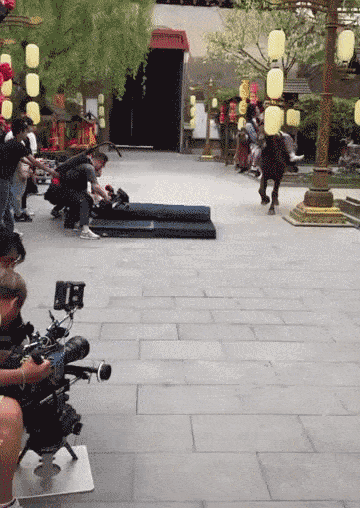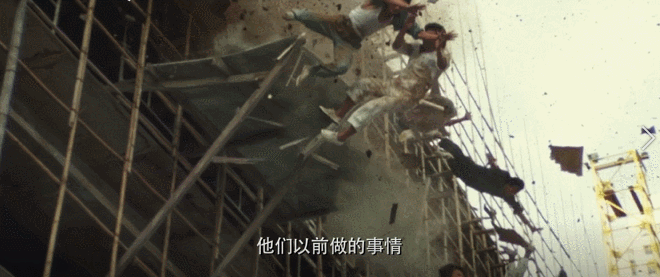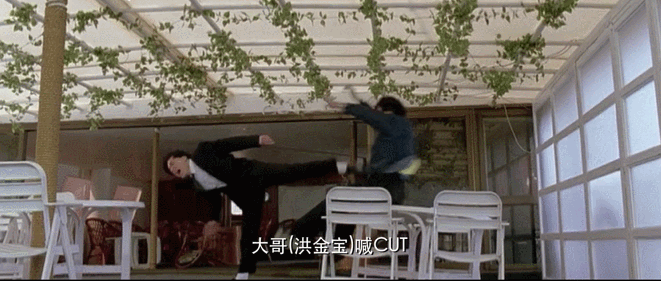"When the director calls cut, he calls for saving lives, not calling it a day."
Wen Observer Network Yan Shanshan
Do you still remember the worrying scene of a costume drama shooting scene not long ago? An actor was abruptly thrown on the concrete floor from a horse’s back, and it hurt to watch.
But such a scene is no stranger to martial arts actors. In the 1960s and 1980s, in Hongkong, China, some people even challenged the action of "who does and who dies".

"Eldest brother (Sammo Hung) shout cut, save lives! It is to shout’ save people’, not’ call it a day’. " Qian Jiale recalled.
Those China Kung Fu filmmakers are determined to suffer the most, suffer the most, show their best actions and let the world see the best action movies. They have a common name-"Dragon and Tiger Martial Master".
On August 28th, Andy Lau wrote the title of the film, and the documentary "Dragon Tiger Warrior", which assembled the strongest martial artists from Sammo Hung, Yuan Heping, Cheng Xiaodong, Yuan Wah, Donnie Yen and Qian Jiale, will be released soon.
What is a Dragon and Tiger Master?
Dragon and Tiger Martial Arts Master is a special type of work created by Hong Kong Kung Fu martial arts films, and it is a group of people who have been "always defeated and never killed". They appear in the movie as the foil of the hero or body double, and they go into battle to complete all the dangerous actions themselves.
During the decades of development of Kung Fu martial arts films in Hong Kong, many martial arts teams, big and small, have emerged. After gaining a foothold in the film industry, Jackie Chan, Sammo Hung, Yuan Heping, Liu Jialiang and other martial arts stars and martial arts directors have slowly drawn some disciples into the industry, so that everyone can "eat" together.

The heads of big adult classes, Hongjiaban, Yuanjiaban, etc. are all sent from the north, and their martial arts skills are inherited from the stage and they are good at leg skills; Liu Jiaban was sent from the south and was good at boxing.
At the peak of Kung Fu movies, a large number of children from poor families devoted themselves to the martial arts profession, and body double, stunt and walk-on gained considerable income despite their hard work.
According to the Chengdu Business Daily, Xiong Xinxin, a member of Liu Jiaban, recalled that he went to Hong Kong as a martial artist in 1987 and earned more than 8,000 yuan a month, which was more than 150 times the salary of his previous martial arts coach in the Mainland. "At that time, one month’s income was equivalent to the income of the Mainland for more than ten years."
But the dangers that come with high salaries are unimaginable to ordinary people. After winning the Hong Kong Film Awards, Kara Wai, the "class flower" of Liu Jiaban in those days, recalled that he still had a lingering fear when he started the filming scene. "All martial artists will encounter the problem of pain, and we may have to shoot it more than ten times in one second. The achievements of kung fu actors are all exchanged for health. "
When filming "Indiana Jones" (1989), the actor was asked to descend from a dozen-storey building, and Kara Wai went into battle himself.

The movie "Indiana Jones"
Kara Wai remembers that at that time, the insurance company didn’t want to insure the martial artists. "Because all we did were high-risk actions, the insurance company didn’t think we were long-term partners. Later, it was slowly available, but the price would be particularly high. "
In those years, the Dragon and Tiger Martial Masters won the respect of the world with the spirit of fighting for their lives, and also spelled out the golden age of Hong Kong action movies.

Nowadays, many martial arts stars we are familiar with are also from martial arts.
For example, Max Zhang, who won the Best Supporting Actor Award in the 33rd Hong Kong Film Awards for his role of "Ma San" in "The Master", was a national Wushu champion. After retiring, he joined the "Yuan Jiaban" in Yuan Heping and worked as a martial arts instructor and body double.
In the Vincent Chiao version of Xiao Li Fei Dao (1999), Max Zhang served as body double of Alyssa Chia (Sun Xiaohong).

Today, Jason Wu, the representative of mainland kung fu films, also made his debut from Hong Kong kung fu films. In an interview, he recalled that when filming Kung Fu Boys in Love (1996) and Tai Chi Master (1997), director Zhang Xinyan asked him to work as an extra actor and body double when he had no chance, because "this industry is serving you" and "feel what they are doing and understand them".

There is also a group of photos circulating on the Internet. When Jason Wu filmed the TV series Ghost Story in 2003, he played Zhuge Liuyun, and it seems that he made a guest appearance as the martial artist of Yan Hongye (Jessica Hester Hsuan).

Jason Wu still remembers that the set rule of the older generation is that even the leading actor, after work, should take the initiative to help the crew carry something besides his own bag, "even if you help the camera crew with a triangle, carry a box conveniently", which is a respect for the behind-the-scenes workers.
"Director Zhang Xinyan taught me how to be a man, to be an actor who respects movies and his professional ethics. Director Yuan Heping taught me how to respect my profession and major, and filmed "Tai Chi Master", 20 episodes. We filmed for five and a half months, and now it is 50 episodes for two months. Is this attitude still there? " Jason Wu said with emotion.
Hong Kong Kung Fu Films from the Golden Age to "Living on Old Capital"
From 1960s to 1980s, Hong Kong’s action films had the best creativity and the most difficult movements. Sammo Hung recalled: "At that time, martial arts was the most vigorous time, and we saw kung fu in real skills."
At that time, when foreign filmmakers visited the class, they would say to the Hong Kong martial arts firm, "Do you dare to do this? Whoever does this action will die. "

"stuntmen never saidno." The words of Xiong Xinxin, a martial arts instructor and actor, showed the spirit of "fighting for one’s life" in those days.
In this way, several generations of action stuntmen hit hard and hit China movies to Hollywood with one punch and one foot. But many of them are unknown.
On August 7th, Jackie Chan mourned two members of the adult class who passed away recently in Weibo, one was Yang Sheng, the second generation member of the adult class, and the other was Brandli, the fourth generation member of the adult class. Their names are not familiar to everyone, but the stunt scenes they have contributed are classic.

Yang Sheng joined the adult class in 1984. When filming never to lose, he, as the body double of Brigitte Lin, had to jump from the top of a 30-meter-high building into a 1.3-meter-deep water pool, with a distance of 15 meters between the building and the pool.


"(Yang Sheng) had a very thrilling action performance in" never to lose ",which made me see the ability and courage of mainland action filmmakers at that time, and the days of risking my life with him were just around the corner." Jackie Chan lamented.
Brandli met Jackie Chan when he visited A Good Man as a movie fan in 1996. Because he loved China Kung Fu and worked hard, Brandli became a martial artist. Later, he joined a family class and starred in The Glass Bottle with Jackie Chan. In recent years, he has become a hot action director in Hollywood, and he has appeared on the set in Wonder Woman, Kingsman.
"Within a few days, the family class lost two relatives, and my mood is indescribable. Apart from missing my brother, I can only tell myself that we should persist in running the action movie week and the China Action stuntmen Working Committee, so as to strive for more space for action filmmakers to show their works and abilities, and also strive for basic protection and respect for more grassroots stuntmen. This is what I have the ability to do, should do and must do at this stage of my life. " Jackie Chan wrote.
The plight of Hong Kong Kung Fu films is in the eyes of Hong Kong filmmakers.
Not long ago, Nicholas Tse said in an interview: "There are only a few action directors all the time. This is not a healthy cycle, it is a phenomenon of eating old money."

When talking about the reasons why the entertainment circle in Hong Kong is so green and yellow, Nicholas Tse bluntly said that it is because "we don’t want to invest time and money", and Hong Kong only looks at "short-term". Newcomers don’t have a chance to make some works that everyone will remember. When it comes to making action movies, they still have to look for directors of the older generation, so there is no other choice, which is very dangerous for the industry.
Action directors are dating, and star shooting is also dating. Behind this, there are reasons why the theme no longer catches people and the technology of the film industry is upgraded.
In 2019, at the closing ceremony of the 5th Jackie Chan International Action Film Week, Jackie Chan said that with the development of the film industry, computer special effects can make action actors "live lightly".
Nowadays, one person hits four strokes in the east, and the next person picks up four strokes. As soon as the computer is synthesized, there will be a fight. Unlike in the 1980 s, the knife will almost be cut from the real person. "In the past, the actions must be done by real people. Now many actions are done by computers, and almost everything can be done. CG characters fictional by computers can also make very beautiful actions, even more powerful than our real actions." Jackie Chan said frankly.
It can be said that Kung Fu filmmakers have witnessed the bloody history of "Wyndell Dichinson Yau Tsim Mong, fighting against Hollywood", and they are also facing today’s predicament. The documentary "Dragon Tiger Martial Arts Master" shows the changes of Hong Kong Dragon Tiger Martial Arts Master in all directions for the first time in more than 60 years.
Wei Junzi, the film director, Hong Kong film researcher and senior filmmaker, visited and photographed nearly 100 martial arts seniors and newcomers after three years, and combed a vast amount of video materials.
The documentary brings together Sammo Hung, Yuan Heping, Cheng Xiaodong, Yuan Wah, Donnie Yen and other action superstars and famous martial arts fingers. They tell the glorious era from costume martial arts to fashion action. Through the perspectives of famous directors such as Tsui Hark, Liu Weiqiang and Wu Siyuan, it shows the diverse features of Hong Kong Kung Fu films from the golden age to the decline.
As director Tsui Hark said: "What they did before, no one will do it in the future."

In addition, Qian Jiale, Chung Chi Li, Ku Huen Chiu and other Mesozoic Wuzhi shared their experiences from the environment of Hongkong and the Mainland in recent years.

Other senior martial artists, such as Mars, Liu Yun, Hou Yaozong, Benny, and Zhong Fa, also made their debut this time, which opened another screen course of "heroes with warm blood come forth in large numbers".
A few days ago, the documentary "Dragon Tiger Warrior" was announced to be finalized on August 28th. In the poster released on the 18th, every scar on the scarred back corresponds to a classic action film, and the title of "Dragon Tiger Warrior" was inscribed by Andy Lau.

Source | Observer Network
:,。 Video applet likes, tap twice to cancel like watching, tap twice to cancel watching.
Original title: "When the director calls cut, he calls for saving lives, not calling it a day" "
Read the original text